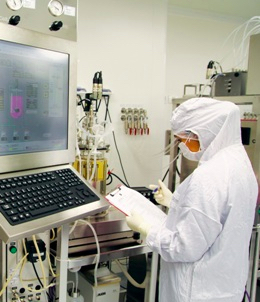Novel PAH Cell Therapy Shows Safety in Early Phase 1 Results
Written by |

Haifa, Israel-based Pluristem Therapeutics Inc. announced that it has received a notice from United Therapeutics Corporation ending its licensing agreement for development of the cell-based candidate PLX-PAD for the treatment of pulmonary arterial hypertension (PAH).
Under the agreement’s terms, Pluristem will recover full rights to PLX-PAD and retain all clinical data and regulatory submissions, allowing the company to move forward with its development and seek other licensing partners. Pluristem is a clinical-stage biotechnology company that uses placental cells and a unique, proprietary, three-dimensional (3-D) technology platform to develop cell therapies for a broad spectrum of diseases.
Meanwhile, data from the first cohort of three patients given PLX-PAD in the single-arm Phase I trial, commenced by United Therapeutics in September 2014, demonstrate a good safety profile and an encouraging, albeit limited, efficacy trend for the treatment.
The clinical study’s purpose is to assess the safety of PLX-PAD to treat PAH with a cell-based product made of allogeneic mesenchymal-like adherent stromal cells (ASCs), derived from human full-term placentas following an elective caesarean section. The study will evaluate the safety of three different dose levels of PLX-PAD, each given as a single intravenous infusion, and the effects PLX-PAD may have on PAH, as seen in changes in ability to exercise and other measures of disease severity.
Pluristem reports that initial findings from cohort 1 suggest an average improvement of 21 meters from baseline in the six-minute walk distance (6MWD) at three-month follow-up. Two patients with Grade 2 (moderate) PAH had an average improvement of 40 meters in 6MWD. This cohort received a single IV injection of 0.5 million cells/kg of patient weight. Enrollment of a second cohort is complete and follow-up is ongoing. These patients received 1 million cells/kg patient weight.
 “We thank United for the work they have completed on this project and believe PLX-PAD can make a significant contribution to the health of patients suffering from PAH,” says Pluristem chairman and CEO, Zami Aberman, in a release. “The data generated by United provides a good foundation to suggest that our cells can be safely administered intravenously, with potential broad application, and can improve the quality of life for PAH patients. We have previously announced results from several studies that demonstrate the safety of intramuscular administration, and with the new intravenous data we can now expand the potential indications for which PLX cells can be used.”
“We thank United for the work they have completed on this project and believe PLX-PAD can make a significant contribution to the health of patients suffering from PAH,” says Pluristem chairman and CEO, Zami Aberman, in a release. “The data generated by United provides a good foundation to suggest that our cells can be safely administered intravenously, with potential broad application, and can improve the quality of life for PAH patients. We have previously announced results from several studies that demonstrate the safety of intramuscular administration, and with the new intravenous data we can now expand the potential indications for which PLX cells can be used.”
Pluristem’s PLX (PLacental eXpanded) cells, which secrete therapeutic proteins in response to signals produced by damaged tissues, are expanded in the company’s state-of-the-art manufacturing facility in proprietary bioreactor systems that create a three-dimensional microenvironment. The company says this 3-D technology allows for controlled, large-scale growth of cells that can be mass-produced, with batch-to-batch consistency, for a fraction of the cost of traditionally expanded cells using culture dishes.
The products are all derived from the placental source but differ in their therapeutic secretion profile and characterization. These tailored differences are enabled by the cell’s culturing environment, which is the result of the tightly controlled manufacturing process. Pluristem’s pipeline targets multiple indications involving inflammation and ischemia, including peripheral artery disease, muscle injury, pre-eclampsia, and graft versus host disease. PLX cells require no tissue matching prior to administration, making them an off-the-shelf product.
“Our vision at Pluristem Therapeutics is to leverage our position as a global leader in placenta-based cell science to develop and manufacture safe and effective cell therapy products,”says Aberman. “We believe our cutting-edge technology can produce therapies that will help people affected by inflammation, ischemia, hematological disorders, and acute radiation syndrome, and establish us as a leading company in the cell therapy arena. We also believe that in cell therapy the process is the product, and precise control of the entire process, from obtaining cells from the source, to delivery to the patient, is vital to the success of a cell therapy. Our fully automated process, proprietary 3D cell expansion technology and increasing knowledge of the placental cell drive us to continue developing additional candidates for our product portfolio.”
Aberman added: “Recently we have made significant progress in the execution of our strategy to shorten the time to commercialization of our PLX cells. The PLX cell program in critical limb ischemia has been selected for the European Medicines Agency’s Adaptive Pathways pilot project, which potentially allows for early marketing authorization of a therapy in a restricted patient population, and the possibility of later approval for use in broader patient populations. In Japan, we have applied to the Accelerated Pathway for Regenerative Medicine for our PLX cells in critical limb ischemia. Japan’s Pharmaceuticals and Medical Devices Agency just validated the proposed quality and large-scale manufacturing methods for PLX-PAD cells for use in clinical trials there. We are hopeful that these rapid pathways will allow us to shorten the time it will take to bring our advanced cell therapies to patients in need of innovative treatments.”
For more information, visit: www.pluristem.com
Sources:
Pluristem Therapeutics Inc.
United Therapeutics Corporation
ClinicalTrials.gov




